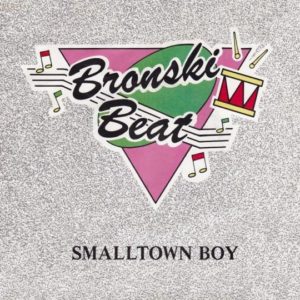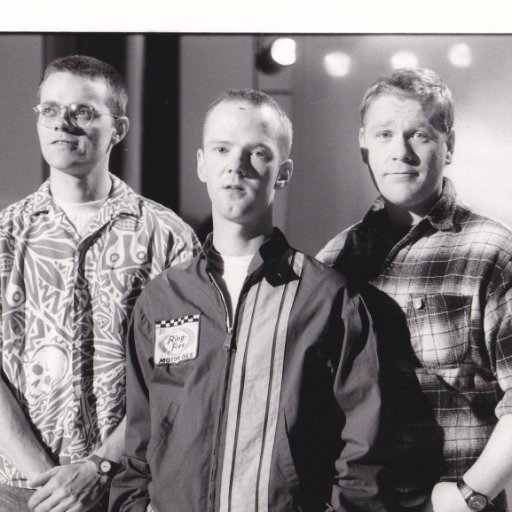June 1984 marked the release of the seminal single ‘Smalltown Boy’ by Bronski Beat, with lyrics about a young man forced to abandon his home town for fear of disapproval, it drew on Glaswegian singer Jimmy Somerville’s own experiences as a gay man in the provinces. Although by no means the first act to feature a gay singer, Boy George, Sylvester, Visage, Soft Cell et al all predate them, it spoke with brutal honesty about the experiences of gay people in the 1980s, bringing the issue of homophobia into the mainstream consciousness, when it landed in the charts in the summer of 1984. That might not seem that out of the ordinary now, where Pride is celebrated widely and music represents a range of sexual identities, but back in 1984, when coming out was difficult and section 28 was still in force, it was an important moment for the visibility of homosexuality, and the issues this minority face within wider culture.
Icy yet instantly recognisable, the song’s signature synth motif that drips like rain, is as redolent of the 1980s as Tears for Fears ‘Everybody wants to rule the world.’ Building and enveloping keys with layered undercurrents and drum machine beats, it has echoes of the likes of Vangelis and Kraftwerk but retains its own personality. Threaded with Jimmy Somerville’s almost mournful falsetto. A liberal and heartfelt song that literally tapped into the issues facing gay people in the 1980s. But most of all it’s a peerless pop song of exquisite subtle production that skirts the lines of synth-pop and dance. Laced with instrumental loops, it gradually builds to the rush of a chorus that is both hedonistic and floor-filling, Somerville’s unique soaring voice and refrains of “cry, boy, cry” and “run away, turn away”, gloriously tapping into the dichotomies of humanity: the pain and pleasure, the joy and struggle.
“It’s not my song anymore…” Explains Somerville “I’m connected to it but it has its own little life and still continues to connect to people. I think there’s a lot of honesty in that track. ‘Smalltown Boy’ was about leaving Glasgow but it was also about the people I had come to meet on my journey, especially when I was squatting in London. These people had come from all over the country because London was the place to go if you were young, gay and needed to find your identity.”
Against the backdrop of Thatcher’s Britain, openly gay trio, Bronski Beat, met in Brixton, London in 1983, having ‘run away’ to London where gay culture was more accepted.The initial line-up consisting of Somerville (vocals), Steve Bronski (keyboards, percussion) and Larry Steinbachek (keyboards, percussion).
“While we’d come a long way from the Victorian attitudes which still lingered post-WWII, the establishment’s attitude to homosexuality was holding back any progress. In what was termed the social transition in British society from homosexuality as “illegal-but-discussed”, to “legal-but-not-always approved” only in 1967 was it made legal for two adults over 21 to engage in homosexual acts. By 1984 little had changed. Many western countries had reduced the age of consent to 16, but not Britain. Indeed Bronski Beat’s album was called ‘The Age of Consent’ in direct reference to this. And part of this regressive culture was the problem of young men and women feeling stigmatised by the inability of their peers to accept them as they were.
There was still a way to go. The notorious ‘Section 28’ amendment of the local authority bill was introduced in 1988, stating that any local authority “shall not intentionally promote homosexuality or publish material with the intention of promoting homosexuality” or “promote the teaching in any maintained school of the acceptability of homosexuality as a pretended family relationship”. It wasn’t repealed in England until 2003.” (BBC’s People’s song)

‘Smalltown Boy’ also came with a memorable video directed by Bernard Rose, also responsible for the controversial video for Frankie Goes to Hollywood’s excellent 1983 hit ‘Relax‘, which took place in a Caligula-style S&M nightclub. Starring Somerville’s train journey to London, it explicitly addressed homophobia and the potential physical attacks that young gay men lived in fear of and the discrimination those in the LGBTQ+ community face to this day. The director Rose explained it’s down to earth portrayal: “I think it was a very common story, and I think that’s a really interesting example of how to make a scene impactful just on the picture alone. I think it’s a very common experience for people, and I think it even goes beyond the gay issue: people who just are rejected and thrown out like that,” says Rose. “That was Bronski Beat’s message. They were going to point out the essential problems and oppressions involved in being gay at that time, which was you were quite likely to get beaten up somewhere, or thrown out by family. There’s really no question that that’s true. It is still true. In that sense, it was very bold.”
Reaching number three in the UK chart, it was also a massive worldwide hit. A signature song for Somerville who would later go on to have hits with the Communards and solo, but it’s a song that perhaps still defines his work to this day. Its synth riff so iconic that it has been borrowed multiple times including by the likes of Real McCoy, Supermode and in 2015 by Brandon Flowers.
After ‘Smalltown Boy’, other acts like The Pet Shop Boys, Frankie Goes to Hollywood and Erasure continued to make their mark on the charts, showing that gay pop was finally becoming embraced by the mainstream.




